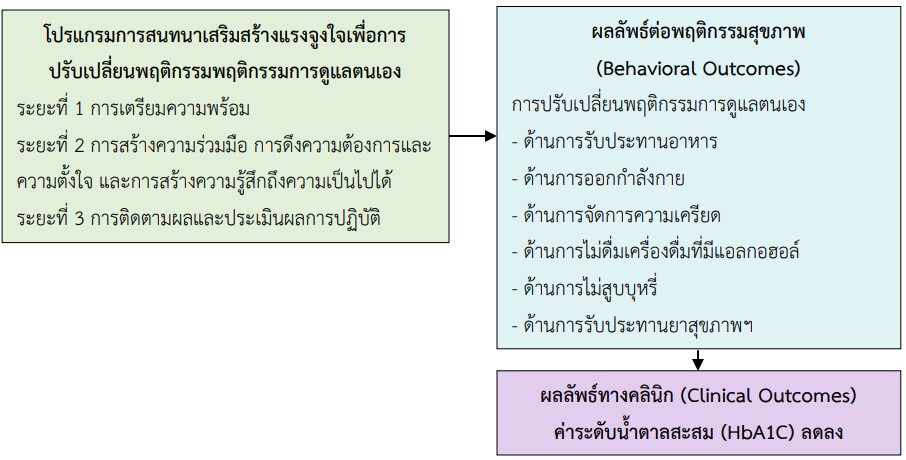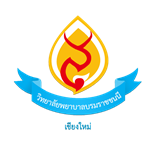Effectiveness of a Motivational Interviewing Program for Changing Self-Care Behaviors in Patients with Diabetes Mellitus
Keywords:
Motivational Interviewing Program, Behavior Modification, Self-Care Behavior, Cumulative Blood Sugar Level, Diabetic PatientsAbstract
The objective of this quasi-experimental study was to compare self-care behavior scores and cumulative blood sugar values of diabetic patients before and after receiving a motivational interviewing program for self-care behavior modification. Participants, selected through purposive sampling, consisted of 30 patients with diabetes and receiving services at the Diabetes Clinic, Ban Kha Chao Subdistrict Health Promoting Hospital. The research instrument included a motivational interviewing program for self-care behavior modification in diabetic patients, developed by the researcher. Data collection tools included a general information record form and a self-care behavior questionnaire for diabetic patients. General data were analyzed using descriptive statistics. A comparison of self-care behavior levels and cumulative blood sugar levels of diabetic patients before and after receiving the program was conducted using the dependent t-test.
The results found that after participating in the program, participants had a higher mean score of overall self-care behavior (Mean = 3.50, S.D. = 0.21) than before participating in the program (Mean = 3.32, S.D. = 0.28), with a statistically significant difference (p-value < 0.001). Additionally, the mean cumulative blood sugar level of the participants after participating in the program (Mean = 7.23, S.D. = 0.64), lower than before participating in the program (Mean = 9.79, S.D. = 12.77), with a statistically significant difference (p-value < 0.001). This indicates that this motivational interviewing program is highly effective. Therefore, health care providers can apply this program to effectively promote self-care behavior modification and reduce cumulative blood sugar levels in diabetic patients within their operational areas.
References
กรมควบคุมโรค กระทรวงสาธารณสุข. (2562). รายงานสถานการณ์โรค NCDs เบาหวาน ความดันโลหิตสูงและปัจจัยเสี่ยงที่เกี่ยวข้อง พ.ศ. 2562. กรุงเทพฯ: อักษรกราฟฟิคแอนด์ดีไซน์.
กองโรคไม่ติดต่อ กรมควบคุมโรค กระทรวงสาธารณสุข. (2564). กรมควบคุมโรค รณรงค์วันเบาหวานโลก ปี 2564 ตระหนักถึงการดูแลรักษาโรคเบาหวาน ให้ได้รับการรักษาอย่างทั่วถึง. สืบค้นเมื่อ 12 พฤศจิกายน 2566 จาก http://moph.go.th.
จักรกฤษณ์ วังราษฎร. (2561). ปัจจัยทำนายพฤติกรรมการบริโภคอาหารของผู้ป่วยโรคไตวายเรื้อรังระยะสุดท้ายที่ได้รับการฟอกเลือดด้วยเครื่องไตเทียม ณ โรงพยาบาลมหาราชนครเชียงใหม่. วิจัยระบบสารธารณสุข, 12(4), 625-635.
นิสากร วิบูลชัย และรุ่งทิวา ศรีเดช. (2563). การพัฒนาโปรแกรมการการเสริมสร้างแรงจูงใจในการจัดการตนเองเพื่อชะลอไตเสื่อมในผู้ป่วยเบาหวานชนิดที่ 2 ที่มีภาวะความดันโลหิตสูง. วารสารแพทย์นาวี, 47(2), 373-393.
พิมพ์ใจ อุ่นบ้าน, สุมิตรพร จอมจันทร์ และณิชชา ทิพย์วรรณ. (2564). ผลของโปรแกรมการจัดการตนเองต่อพฤติกรรมการดูแลตนเองและการควบคุมความดันโลหิตของผู้ป่วยความดันโลหิตสูงที่ควบคุมไม่ได้.วารสารวิทยาลัยพยาบาลบรมราชชนนี อุตรดิตถ์, 13(2), 59-72.
ยุวรัตน์ ม่วงเงิน. (2562). คู่มือการพยาบาล: การปรับเปลี่ยนพฤติกรรมชีวิตในผู้ใหญ่ที่มีภาวะก่อนเกิดโรคเบาหวานชนิดที่2. กรุงเทพฯ: คณะพยาบาลศาสตร์ โรงพยาบาลศิริราช.
โรงพยาบาลส่งเสริมสุขภาพตำบลบ้านขะจาว. (2564). รายงานทะเบียนผู้ป่วยเบาหวานและความดันโลหิตสูง. เชียงใหม่. เอกสารอัดสำเนา.
ละอองกลิ่น กนกแสง. (2564). ผลการสัมภาษณ์เพื่อเสริมสร้างแรงจูงใจต่อพฤติกรรมการดูแลตนเองและระดับน้ำตาลในเลือดสะสมของผู้ป่วยเบาหวานที่ควบคุมระดับน้ำตาลไม่ได้. วารสารวิชาการสำนักงานสาธารณสุขจังหวัดมหาสารคาม, 5(10), 161-170.
ลักษณา พงษ์ภุมมา, ขวัญตา เพชรมณีโชติ, เชษฐา แก้วพรม และเมทณี ระดาบุตร. (2563). ผลของโปรแกรมสัมภาษณ์เพื่อสร้างแรงจูงใจต่อระดับความรู้ พฤติกรรมการดูแลสุขภาพตนเองและดัชนีมวลกายในวัยผู้ใหญ่ที่มีปัจจัยเสี่ยงต่อการเกิดโรคเบาหวานชนิดที่ 2. วารสารวิจัยทางวิทยาศาสตร์สุขภาพ, 14(1), 21-31.
วินัฐ ดวงแสนจันทร์, สิริลักษณ์ สุทธรัตนกุล และประมาณ กิริรัมย์. (2565). ผลของโปรแกรมการส่งเสริมความรอบรู้ด้านสุขภาพต่อพฤติกรรมการส่งเสริมสุขภาพของผู้สูงอายุโรคเบาหวานชนิดที่ 2. วารสารพยาบาล, 71(2), 28-37.
วิภา มะลา และคณะ. (2562). ปัจจัยส่วนบุคคลที่มีความสัมพันธ์กับพฤติกรรมการบริโภคอาหารของผู้ป่วยโรคไตเรื้อรังที่ได้รับการล้างไตทางช่องท้อง ณ คลินิก CAPD โรงพยาบาลม่วงสามสิบ. การเกษตรราชภัฏ, 18(2), 63-78.
สมาคมโรคเบาหวานแห่งประเทศไทย. (2560). แนวทางเวชปฏิบัติสำหรับโรคเบาหวาน 2560. กรุงเทพฯ: ร่มเย็น มีเดีย.
สมาคมโรคเบาหวานแห่งประเทศไทย. (2566). แนวทางเวชปฏิบัติสำหรับโรคเบาหวาน 2566. กรุงเทพฯ: ศรีเมืองการพิมพ์.
โสภา ไชยแก้ว. (2561). การเสริมสร้างแรงจูงใจในการปรับเปลี่ยนพฤติกรรมผู้ป่วยเบาหวาน ความดันโลหิตสูง โรงพยาบาลส่งเสริมสุขภาพตำบลบ้านท่าข้าม อำเภอเมือง จังหวัดเชียงใหม่. วารสารอนามัยสิ่งแวดล้อม และสุขภาพชุมชน, 5(3), 78-83.
Bilgin, A., Muz, G., & Yuce, G. E. (2022). The effect of motivational interviewing on metabolic control and psychosocial variables in individuals diagnosed with diabetes: Systematic review and meta-analysis. Patient Education and Counseling, 105(9), 2806-2823. https://doi.org/10.1016/j.pec.2022.04.008
Cohen, J. (1977). Statistical power analysis for the behavioral sciences. New York: Academic Press.
Faul, F., Erdfelder, E., Lang, A.-G., & Buchner, A. (2007). G*Power 3: A flexible statistical power analysis program for the social, behavioral, and biomedical sciences. Behavior Research Methods, 39, 175-191. https://doi.org/10.3758/bf03193146
Mikkonen, U., et al. (2023). The effects of motivational self-care promotion on depressive symptoms among adults with type 2 diabetes: A systematic review and meta-analysis. Preventive Medicine Reports, 36, 102431. https://doi.org/10.1016/j.pmedr.2023.102431
Miller, W. R., & Rollnick, S. (2002). Motivational interviewing: Preparing people for change (2nd ed.). The Guilford Press.
Tarricone, R., Petracca, F., Svae, L., Cucciniello, M., & Ciani, O. (2024). Which behaviour change techniques work best for diabetes self-management mobile apps? Results from a systematic review and meta-analysis of randomised controlled trials. EBioMedicine, 103, 105091. https://doi.org/10.1016/j.ebiom.2024.105091
Thepwongsa, I., Muthukumar, R., & Kessomboon, P. (2017). Motivational interviewing by general practitioners for Type 2 diabetes patients: a systematic review. Family Practice, 34(4), 376-383. https://doi.org/10.1093/fampra/cmx045
Waggiallah, H. A., et al. (2023). Impact of Uncontrolled Diabetes Mellitus on Blood Cells Indices and Plasma Components in Patients Without Nephropathy. Pakistan Journal of Biological Sciences: PJBS, 26(5), 279-286. https://doi.org/10.3923/pjbs.2023.279.286

Downloads
Published
How to Cite
Issue
Section
License
Copyright (c) 2024 Journal of Nursing and Public Health Research

This work is licensed under a Creative Commons Attribution-NonCommercial-NoDerivatives 4.0 International License.
1. บทความหรือข้อคิดเห็นใด ๆ ที่ปรากฏในวารสารวิจัยการพยาบาลและการสาธารณสุข ที่เป็นวรรณกรรมของผู้เขียน บรรณาธิการไม่จำเป็นต้องเห็นด้วย
2. บทความที่ได้รับการตีพิมพ์ถือเป็นลิขสิทธิ์ของ วารสารวิจัยการพยาบาลและการสาธารณสุข








